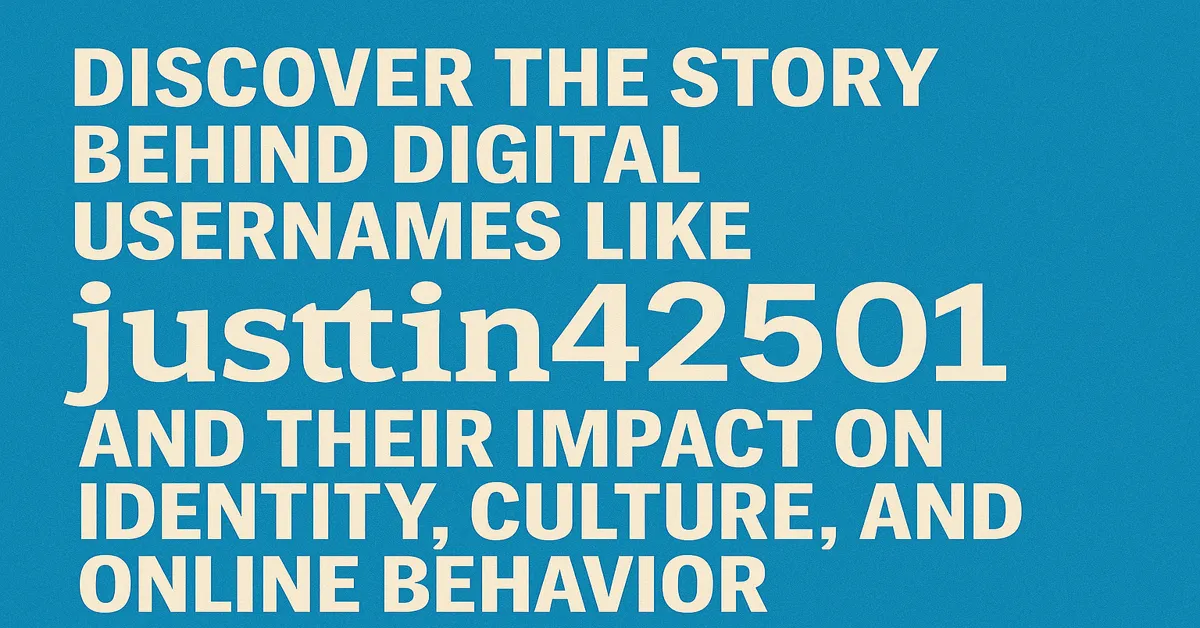In an age where usernames speak volumes, what does “justin42501” really say? For millions of users across social media platforms, gaming services, and online forums, names like “justin42501” are more than simple identifiers — they’re the masks, memoirs, and monograms of our digital selves. Though the term “justin42501” may not signify a specific public figure, brand, or known entity at first glance, it functions as a compelling case study into the construction and meaning of modern online identity.
From humble usernames born out of AOL chatrooms to today’s dynamic avatars in virtual spaces like Roblox, Discord, and TikTok, a term like “justin42501” opens a portal into a deeper cultural shift: the quiet evolution of how we express who we are online, and how that changes the fabric of social interaction, privacy, and even legacy.
The Rise of the Username
In the earliest days of the internet, identity was often obscured. Users on bulletin board systems (BBS) or early forums adopted pseudonyms partly for privacy, partly for expression. Unlike real-world naming conventions bound by birth, culture, or language, digital identities allowed for freedom, reinvention, and anonymity.
“justin42501” likely reflects this ethos: “Justin” could represent a common first name, while “42501” may reference a ZIP code (Somerset, Kentucky), a birthdate, or even a random series of numerals generated when the original name was already taken.
This pattern — name plus numbers — is emblematic of a broader trend: the personalization of identity within digital limitations. When usernames became the primary key to an online identity, people found creative ways to distinguish themselves in crowded digital rooms.
What’s in a Name? More Than You Think
When users choose or are assigned usernames like “justin42501,” they are crafting not only how others perceive them, but also how they engage with the digital world. Recent studies in digital sociology reveal that people associate identity markers with emotional expression, generational belonging, and even moral alignment.
Consider these layers:
- Cultural Roots: The name “Justin” peaked in popularity in the late ‘80s and early ‘90s in North America. If “justin42501” reflects a real person’s name and birth year or ZIP code, we already begin to trace geographic and temporal identities.
- Numerical Suffixes: Numbers in usernames aren’t arbitrary. They often hold personal meaning or compensate for platform limitations. When platforms disallow duplicate names, adding numbers becomes a creative workaround — or an algorithmic necessity.
- Platform Identity Persistence: Many users carry the same handle across different platforms. “justin42501” on YouTube may be the same person on Twitter, Twitch, and Reddit. This creates a form of platform transversality, where a singular identity spans multiple digital environments.
The Semiotics of Online Selfhood
Linguists and digital theorists have explored how usernames function semiotically — that is, as signs that represent a deeper meaning beyond the characters themselves. “justin42501” functions as a linguistic fingerprint, one that signifies both the individual and the context of their digital environment.
Three critical themes emerge in this analysis:
- Symbolism – A name like “justin42501” is symbolic, hinting at personality, preferences, or past events. The user may associate fond memories, inside jokes, or even trauma with the handle.
- Relatability – Simpler names with human-first formats (like Justin) invite connection. They signal humanity in an increasingly bot-populated digital sphere.
- Anonymity + Familiarity – While not revealing full identities, usernames still allow for a sense of continuity and familiarity across online spaces.
The Globalization of Identity
In an interconnected world, a username may traverse countries, cultures, and languages. What “justin42501” means in Kentucky may differ radically from its interpretation in Seoul, Lagos, or Mumbai. Online identity becomes both intensely personal and radically global.
That globalization forces new conversations around naming norms:
- Language barriers are broken through alphanumeric usernames.
- Cultural meanings shift — a name like “Justin” may invoke Western pop culture associations (Justin Timberlake, Justin Bieber) depending on the region.
- Searchability and discoverability become crucial — users want unique handles for SEO, brand growth, and networking.
Digital Mortality and Persistence
One rarely discussed aspect of usernames like “justin42501” is digital mortality — what happens to our online identities after we stop using them, or after we die?
In many cases, usernames persist long after the user has logged off for good. Old blog comments, archived social media posts, or even cached web content can maintain a digital shadow — an echo of “justin42501” long after the person behind it disappears from active use.
Digital rights advocates argue for stronger legislation around “data legacy,” prompting platforms to allow for user-specified deletion or memorialization. In such a future, names like “justin42501” could become part of our collective historical record — personal usernames turned cultural artifacts.
Pseudonymity vs. Anonymity
Pseudonymity — the state of being known by a consistent alias — is distinct from anonymity. “justin42501” may not be the user’s legal name, but if it is used consistently across digital platforms, it becomes reputation-bearing. This distinction matters more today than ever before.
Why?
- Reputation Systems: Platforms like eBay, Reddit, or Stack Overflow rely on consistent behavior under a single username.
- Community Moderation: Pseudonyms help enforce rules by tying actions to persistent identities.
- Civic Participation: In activist and political spaces, pseudonymity allows whistleblowers or organizers to speak out while maintaining safety.
The Algorithmic View of a Username
To users, “justin42501” may be an expression. To platforms and algorithms, it’s data.
Usernames are key inputs in algorithmic profiling:
- They feed into recommendation systems.
- They factor into behavioral analytics and pattern recognition.
- In AI training sets, usernames are often de-identified but still used as predictive markers for certain actions or interests.
The algorithm doesn’t care what “justin42501” means emotionally. It sees a pattern of behaviors — posts, likes, follows — and turns that into a digital shadow that informs its next prediction.
This has both ethical and practical implications. Are we comfortable with machines interpreting our chosen names to determine our political leanings, product preferences, or even criminal risk?
From Screen Name to Personal Brand
In the influencer era, names like “justin42501” may be reinterpreted not as casual identifiers but as personal brands.
Many successful content creators began with seemingly arbitrary usernames, later investing in them with meaning, storytelling, and brand aesthetics. What starts as a handle becomes a lifestyle — often complete with merchandise, logos, and fandoms.
The psychology here is subtle but significant:
- Audiences prefer authentic-sounding names.
- Slightly imperfect or humble names (with numbers, lower-case styling, etc.) convey approachability.
- Changing your handle later may confuse loyal followers or disrupt SEO.
So even if “justin42501” wasn’t meant to be a brand, over time, it can become one.
The Dark Side: Harassment, Spoofing, and Data Exploitation
Unfortunately, the rise of digital identity brings risks. Usernames like “justin42501” can be cloned, spoofed, or targeted.
- Impersonation: Fake accounts mimicking real users cause reputational harm.
- Doxxing: When pseudonymous usernames are linked to real-world information, the fallout can be severe.
- Data leaks: A leaked email address or password tied to a handle like “justin42501” may be exploited across other platforms.
Cybersecurity experts advise using unique usernames per platform — a strategy that clashes with the human desire for identity continuity.
Legal and Policy Dimensions
In 2024, several governments introduced legislation mandating real-name verification for some online services. The debate centers around balancing freedom of speech and online accountability.
Where does that leave “justin42501”?
In many contexts, still protected. In others, potentially forced to link to real-world identity. Activists warn this erodes privacy and chills free expression, especially in authoritarian regimes.
Policymakers face a dilemma: how to protect citizens from digital harm without stifling the complex web of pseudonymous identity online.
A Reflection of Us All
Whether “justin42501” is a teen gamer in Kentucky, a nostalgic handle from the early 2000s, or simply a symbolic entry in this discussion, it reminds us of the intimate, fragile, and often overlooked terrain of digital selfhood.
Every username is a narrative waiting to be told — a blend of identity, context, emotion, and technology. In a world increasingly defined by our virtual footprints, understanding names like “justin42501” isn’t a curiosity.
It’s a necessity.
Final Thoughts
As we step deeper into a future where identities are mediated through pixels and platforms, the seemingly simple act of choosing a username — like “justin42501” — becomes profound. It encapsulates our desires, our histories, our strategies for privacy, and our hopes for recognition.
So the next time you see a string of letters and numbers attached to a comment, a video, or a digital product, pause. Ask not just who it is — but what it represents in the grander story of the digital human.
Read: Syair HK: Unraveling the Tradition of Poetic Prediction in a Modern World
FAQs
1. What does “justin42501” mean?
“justin42501” is likely a digital username composed of a first name (Justin) and a number sequence. The numbers could represent a ZIP code (42501 corresponds to Somerset, Kentucky), a date, or a unique identifier chosen by the user when “Justin” was already taken. It represents the broader trend of personalizing usernames in the digital age.
2. Why do usernames often include numbers like in “justin42501”?
Usernames include numbers for uniqueness, personalization, or when the base name is already in use. Numbers can represent birth dates, location codes, lucky numbers, or simply system-generated tags. In the case of “justin42501,” the numbers might add a layer of identity without revealing too much personal information.
3. Can usernames like “justin42501” be used across multiple platforms?
Yes. Many people reuse usernames across platforms like YouTube, Instagram, Reddit, and gaming services to maintain a consistent digital identity. However, this makes them more vulnerable to impersonation, tracking, or data exposure, so cybersecurity experts recommend platform-specific usernames when privacy is a concern.
4. What are the risks of using a username like “justin42501”?
While usernames help establish identity, they can pose risks if reused widely. These risks include:
- Impersonation by bad actors,
- Doxxing if linked to real-world data,
- Data breaches if used with compromised accounts.
Maintaining strong passwords and using two-factor authentication helps protect such usernames.
5. How do usernames like “justin42501” reflect digital culture?
Usernames like “justin42501” are more than functional labels — they reflect generational trends, platform constraints, and personal creativity. They show how people merge anonymity with self-expression, creating digital personas that evolve with technology and culture.











